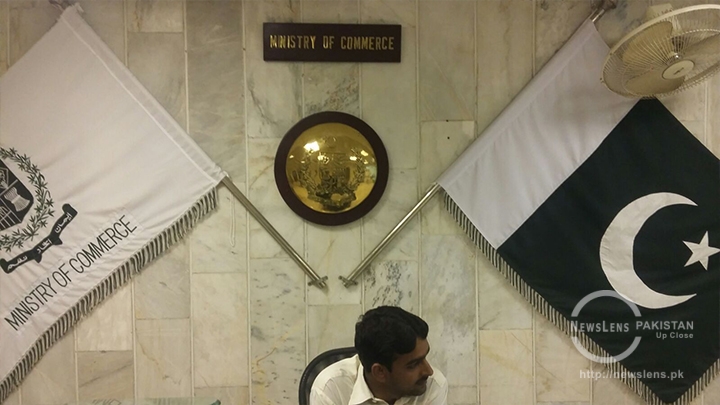ISLAMABAD: The much-delayed Pak, Afghan and Tajikistan Trilateral Transit Trade Agreement (PATTTTA) deadlocked following Kabul insistence to include New Delhi in the ambitious project but Islamabad rejected the idea because of tense diplomatic ties between the two countries, a senior Pakistani official said.
Requesting for anonymity because he is not authorized to speak to media, an official at the Ministry of Commerce told News Lens Pakistan that Islamabad is concerned about diplomatic relations with India, which is stopping the two countries from moving forward on the vital issues.
Afghanistan Embassy in Islamabad did not respond to a request of News Lens Pakistan for comments on the subject.

The ministry’s official recalled that the maiden meeting was held in Islamabad in March 2015 to review plan for PATTTTA.
Then Pakistani secretary commerce Shahzad Arbab, acting minister for commerce and industry of Afghanistan, Muzammil Shinwari and Deputy Minister for Commerce of Tajikistan Saeed Rehman represented their sides during the first Expert-Level Group Meeting some months back in Islamabad, the official recalled.
During the lengthy discussion, all the three stakeholders decided to step up consultation process to reach a conclusive agreement, he added. The three parties succeeded to appoint focal persons for technical discussions and hold another meeting in Dushanbe with the first draft of the trilateral trade agreement.
In addition, they hoped that final draft of the agreement would be most probably signed in Kabul this year, the official added.
Minister for Commerce Khurram Dastgir Khan told News Lens Pakistan that enhanced connectivity and speedy access to ports of Gawadar and Karachi provides the Central Asian Republics and Afghanistan a cost effective option for trade with the world. “Economic and trade relations should be ring-fenced from other political and security considerations,” the minister added.
The war on terror, now in its 14th year, has shattered economy of Pakistan and Afghanistan and damaged the infrastructure in both countries.
Ashfaq Hassan Khan, former economic advisor to government of Pakistan, said: “Afghanistan is speaking the language of India. It is the desire of India to get itself included in the project.” But under the current political scenario, Khan said Pakistan would not be in a position to provide India with the facility.
However, if a breakthrough is achieved, he hoped economic activities would spur not only in Pakistan and India but in the region as well.
“New Delhi has to change its stand vis-à-vis Pakistan,” Khan said, adding that Indian Prime Minister Narendra Modi has to take bold steps to normalize relations with Pakistan in larger interest of people’s progress and prosperity.
The official at the Ministry of Commerce said that Arbab Shahzad in his inaugural address said mutual dependence of regional countries offers opportunity of connecting with each other. “Islamabad is desirous to establish trade links with Central Asia and neighboring states and provide them link to world through warm seas at the South of Pakistan,” Shahzad added.
Muzzamil Shinwari had said the agreement would be a landmark to achieve regional and economic integration. “The signing of PATTTTA will be a win-win situation for all the three countries in particular and the region in general,” Shinwari noted.
However, Saeed said the involved countries have traditional economic linkages which are deepening further.
“Establishing a Common Transport Corridor will bolster regional trade and investment and attract foreign investors because of lucrative economic potential,” he hoped.
In a chat with News Lens Pakistan, Dr. Anwar Shah, assistant professor, School of Economics Quaid-e-Azam University, said: “The inking of the agreement would help flourish Pakistan’s economy. The reason is that Pakistan will get access to a larger market through this agreement.”
Economic activities, he said would increase benefiting many sectors within Pakistan and job opportunities would multiply, helping Pakistan to overcome one of its main economic problem.
Earlier, the ministry’s official said that the fifth Afghanistan-Pakistan Transit Trade Coordination Authority discussed in details issues faced by traders of both the countries.
Documents available with News Lens Pakistan revealed that a number of thorny issues such as interchange of electronic data, steps to curtail transit’s cost, facilitation of trade related activities at Karachi ports, Single Goods Declaration Format for bilateral trade as well as transit, setting up of Joint Business Councils, multiple entry visas for Pakistani workers, Custom Cooperation Agreement (CCA) between the two countries and other modalities with regard of Goods Declaration (GD) at Torkham for Pakistan’s Exports were discussed.
Shah said the links between the three countries would decrease the cost of transaction for the business community of Afghanistan helping them to expand the business.
“There is need to simplify and facilitate business community in decreasing the transaction cost of doing business with each other. For example, tackling the issues of delay in clearance, long queues of trucks on borders and repeated checks by security forces will decrease the transaction cost of doing business,” Shah remarked.
Dastgir said that accession to TIR Convention is a great step forward in trade facilitation and it was under Pakistan’s consideration for the last 13 long years.
The United Nations Economic Commission for Europe (UNECE) on its webpage said that TIR Convention is a legal framework for traffic-in-transit of goods across borders among the contracting parties without involving payment of Customs duties and taxes.
The UNECE produced the TIR Convention in 1975 that came into force in 1978. In addition, around 68 countries and the European Union (EU) are parties to the Convention.
Laiq Zada Bhittani, vice chairman All Pakistan Oil Tankers’ Owners Association, told News Lens Pakistan that transportation and trade related activities between Pakistan and Afghanistan reduced to great extent. “The transportation activities saw 25 percent decrease since 2011. From 2005 to 2011, we used to send around 1,000 oil tankers to Afghanistan but now that figure reduced to 100 vehicles per month,” he rued.
He said most of the businessmen from the two countries have no knowledge about trade agreement between Islamabad and Kabul but they wanted barrier-free trade.
Younus Khan, an Afghan truck driver, said they have to wait for months these days in Karachi to find a load to Afghanistan. “Business activities have reduced remarkably. We want more business between the two countries because a number of families are associated with the transport business,” he added.



